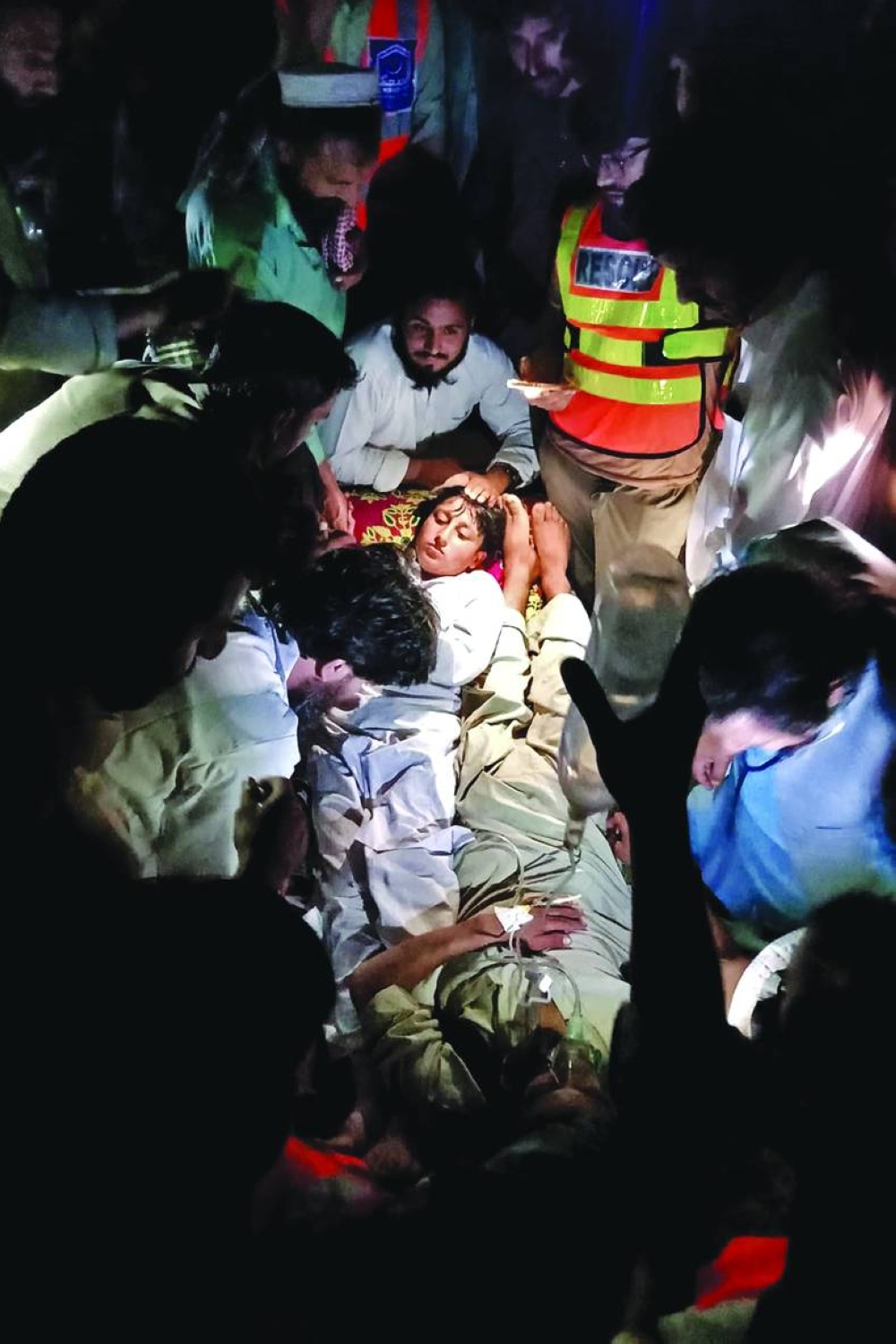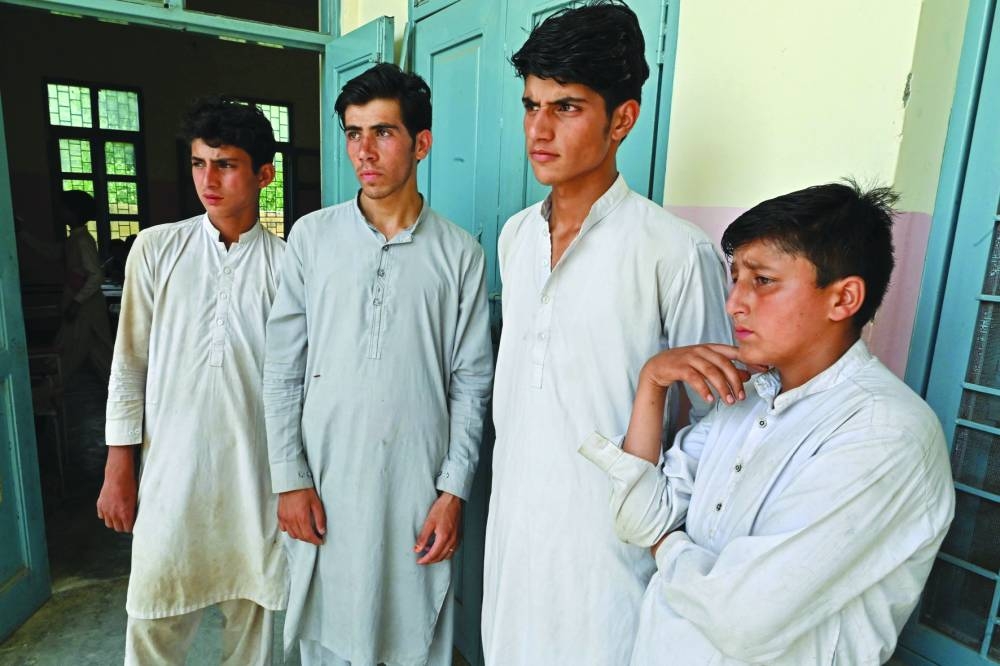When Pakistani villager Gul Faraz rang his family to raise the alarm that a cable had snapped and he and seven schoolchildren were trapped in a cable car swaying in the wind high above a rocky ravine, he doubted he would ever see home again.
“It is an unforgettable day,” Faraz said yesterday, a day after a miraculous rescue, winching two to safety with a helicopter, with locals bringing the rest down on a zip line when it became too dark to fly safely in the gusting winds.
“I can’t tell you what we experienced yesterday when one cable of the cable car suddenly snapped and we were stranded in the air,” said Faraz, who at 20 years old was the only adult aboard, and the only person with a mobile phone.
He called his family first, and then television channel Geo News, whose coverage quickly drew the attention of the world’s media to the drama unfolding in the remote mountains of northwestern Pakistan.
It is a part of the world where cable cars and rickety rope bridges are the fastest way to move from a village on one hillside to its nearest neighbour across ravines and valleys.
The owner and the operator of the cable car have since been arrested, police said yesterday, though the allegations against them were not clear.
The schoolchildren, aged between 10 and 16, had been coming down from their homes in Jhangri to a school in Battangi, comprising two villages in the Allai valley, when the calamity struck at around 7am local time.
The journey by cable car usually takes just a matter of minutes, whereas travelling along the rough mountain roads and tracks takes hours. It would be 16 hours before the high-risk rescue operation brought everyone safely off the flimsy car as it dangled 183 metres above the ground, the military said, lowering the height estimated by officials earlier but making it no less deadly.
There were fears the remaining cable could give way any time, and cries of “God is Great” arose from people gathered around to see the children brought down on harnesses by soldiers on a zip line.
“At some point, I had lost hope that we would safely return home,” Faraz told Reuters by telephone from his home, where his family was receiving visitors from villages across the region, all offering thanks for their survival.
“We got a second life,” he said.
The rescued teenage boys walked to school yesterday to collect their exam results.
Six students were among eight people rescued on Tuesday by military helicopters and local zipline experts as night fell in the remote Allai valley in northwestern Khyber Pakhtunkhwa province.
They were taking the chairlift to school as usual — with three due to collect their end of year exam results — when two of the three cables snapped.
“When this incident happened, I forgot everything. All I remembered at that time was my mother and God,” said 18-year-old Niaz Mohamed from Pashto village.
Yesterday the three students walked two hours to school along a hilly path to find out they had passed their exams, before they sought further medical check-ups.
Some of the passengers told AFP that several times they lost hope in ever being rescued, and had considered leaping from the chairlift.
“Some of the children were so frustrated and considering to jump down, but the elder passenger gave us confidence,” 15-year-old Rizwan Ullah told AFP.
“When the cable car was twisting, we were terrified and we started reciting the Holy Qur’an and gave confidence to each other not to jump down.”
Helicopters flew repeated sorties over the cable car throughout the afternoon as they planned the rescue mission.
At one point an airman was lowered to deliver food and water, but the air pressure from the helicopter caused him to collide with a rope holding the cable car, causing it to twist and shake.
“When the helicopter arrived and left without rescue we lost hope,” said 25-year-old Gul Faraz, a shopkeeper who was in the cable car.
“During the whole process we thought we would die. There were some times when we thought we would not survive.”
Residents used mosque loudspeakers to alert neighbourhood officials of the emergency, and hundreds of people gathered on both sides of the ravine — hours away from any sizeable town — to watch the drama unfold.
Syed Hammad Haider, a senior Khyber Pakhtunkhwa provincial official, said the gondola was hanging about 1,000 to 1,200 feet above the ground.
The daring rescue finally began at dusk with a helicopter plucking a child from the chairlift but the chopper was forced back to base as bad weather closed in and night fell.
Then, commandos from Pakistan’s Special Service Group (SSG) — known as the Maroon Berets — and local experts used the cable keeping the gondola from plunging into the valley as a zipline to rescue the rest of those stranded.
The two adults were the last to be brought to safety. Pakistan’s caretaker Prime Minister Anwaar-ul-Haq Kakar called the rescuers “heroes of the nation”. “Great team work by the military, rescue departments, district administration as well as the local people,” he wrote on X.
Eighteen-year-old Mohamed, who has just started his final year of high school, feels as if he has been given “a second life”.
“It was the most terrifying time of my life. I forgot everything but my mother. I thought only of my mother,” he told AFP.
“When I reached my home she was waiting for me at the gate, we hugged each other, she kissed me and we were in tears. It was very emotional for both of us.
The prime minister has ordered them closed throughout the province for a week while safety inspections are carried out.
But Mohamed, like others in the village, said despite his ordeal, he has no option but to return to using the cable car.
— Reuters, AFP

Victims receiving first aid after being rescued from a chairlift that plunged into a ravine in Pashto village of mountainous Khyber Pakhtunkhwa province. Right: Survivors of the cable car accident speak to a professor at their school in the village yesterday. (Reuters, AFP)

